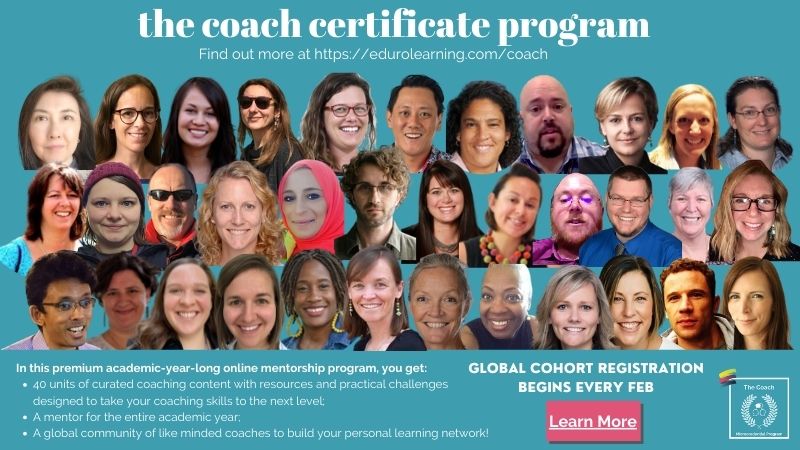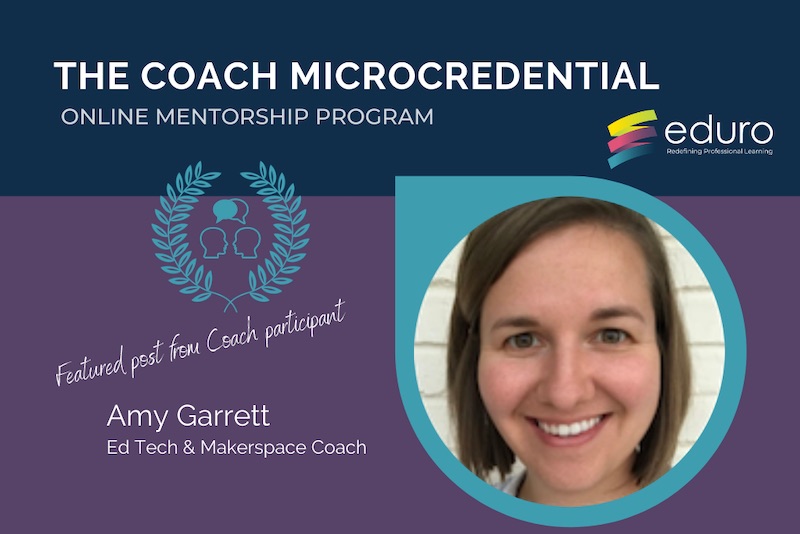We want to give you a peek inside our Coach Certificate & Mentorship Program. Coaches taking part in this academic-year-long journey have graciously given us permission to post some of their learning and reflections from the private coursework they are undertaking during this program. Where possible, we have shared the course and the action task to give context for the guest post.
The Topic: Coaching Foundations: Structures for Success
The Task: Share your thoughts on the coaching cycle. Reflect on how this formalized process works within your current role at your school.
When I consider my role as a coach and how I work to support teachers; the coaching cycle shared in this course is truly a natural template. It’s really hard to imagine veering from this set up. Though, it’s important to intentionally focus on each step. For me personally, the relationship building is the most critical piece and essential to move forward from. I have worked hard in my first year here to build bridges and establish rapport with my colleagues and can already see how that naturally leads itself to flowing through coaching cycles as a result.
As I reflect on the conversations I’ve had with teachers; I notice it looks different particularly with the consulting conversations, as we often skip past any personal detail to “please help me do x”. I am thinking of a coaching cycle I started recently with our primary art teacher. Lately I’ve noticed that often teachers reach out to me for a “tech question” (ie: consulting how-to) but through the course of our conversation it evolves into something much richer. Our art teacher had asked me how to post an assignment in Google Classroom (technically, literally how to). When I arrived, I showed her the basics, but then asked questions about what she was wanting to draw from her students, what they were working on and how we could best capture the learning through “a google classroom assignment”. The conversation shifted entirely from a consulting role to a highly collaborative role. I see potential for it expanding further as well, and wonder if that is often the case. Once you have collaborated with a teacher, they are inspired/empowered/encouraged to push forward and you can shift further out of the focus into the purely coaching role.
As I talked with this teacher; we identified a few goals she had- that initially seemed like tech questions but were truly rooted deeper in best practice, assessment and teaching and learning approaches. I’m excited about the work ahead and feel affirmed from the way this coaching cycle is going that it was a natural and positive shift into this cycle. Hopefully the experience will benefit students- the true goal and why for all educators and the work we do.
One thing I find challenging is the documentation. Being fully present in a conversation while also documenting/taking notes accurately. I have found it vital but also beneficial for both of us, to recap and summarise what we talked about, what our next steps are, and setting the next meeting time at the close of our time together.
I joked this week that I feel like I spend an entire day each week documenting next steps/notes and updating/creating agendas from the many weekly meetings I lead/attend. I find it hard to document coaching conversations especially when your day goes back to back with both team and individual meetings with consulting triage sprinkled throughout. Keeping everything documented and organised is essential for everyone to keep track of where we are and know the next steps, and where to start when we meet next.
Read more from The Coach participants as they share their learning from the certificate & mentorship program…
Debra’s post: The Coach Approach
David’s post: What is Coaching? (Coaching as Leadership)
Cary’s post: Why Do Schools Need Coaches?
Andre’s post: What Challenges Do Coaches Face?
Sandra’s post: Coaching in Practice


Amy, I have to say that I completely agree with this! You describe how most of my coaching conversations have started and worked out. I think this has to do with comfort with tech, once you build a relationship with a teacher which takes the fear out of using the tech then you can begin to have conversations around using tech.
I feel your pain with the documentation. I wonder if you could audio record the sessions you have, especially if you are going to be in a meeting immediately following. I need to consider an option as well because I find that like you I struggle to take good notes and stay present in the conversation.